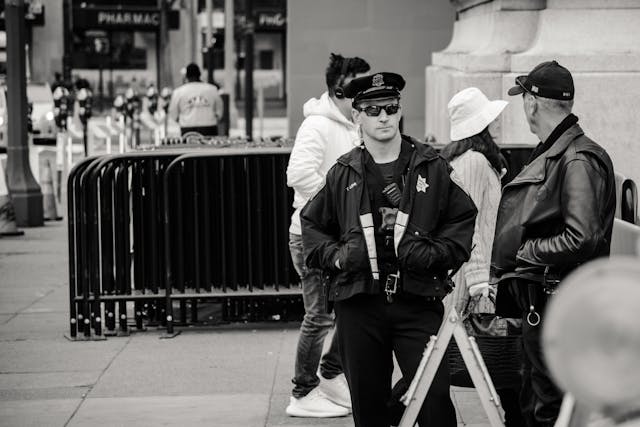The safety and security of your property, staff, and visitors hinges on the quality of your building’s protection. Having a uniform presence is a crucial first step, but not all guards are created equal. When it comes to securing your assets, you can’t afford to settle for the lowest bidder or the most convenient option.
Selecting the right professional security guard requires careful consideration of their training, demeanor, and the company behind them. This isn’t just about vetting an individual; it’s about choosing a reliable partner who will be the public face of your safety protocol.
Here are the critical factors you need to scrutinize when hiring security for your commercial or residential building.
1. Training That Goes Beyond the Basics
 A security professional is more than a watchman; they are a first responder, a conflict mediator, and a customer service representative rolled into one. When evaluating a potential security service, dig into the details of their training program.
A security professional is more than a watchman; they are a first responder, a conflict mediator, and a customer service representative rolled into one. When evaluating a potential security service, dig into the details of their training program.
- Emergency Response: Does the training cover specific emergency scenarios common to your area? This should include fire protocols, medical emergencies (First Aid/CPR), and active threat response. For instance, the U.S. Bureau of Labor Statistics notes that employer-provided training for guards typically covers emergency procedures and crime prevention, but you want to ensure the training is frequent and scenario-based.
- De-escalation and Interpersonal Skills: The majority of security issues are resolved through communication, not confrontation. A well-trained guard knows how to handle an uncooperative person with calm authority. Look for programs that emphasize verbal de-escalation, public relations, and tact, especially if the guard will be stationed in a high-traffic lobby.
- Site-Specific Protocols: A guard for a commercial office building has different duties than one for a residential complex. Will the company take the time to train their personnel on your building’s unique access control systems, visitor management procedures, and high-risk areas?
2. Licensing, Insurance, and Transparency
This is the non-negotiable legal groundwork. Before a contract is signed, the security firm must demonstrate complete compliance and fiscal responsibility.
- Proper Licensing: Most states mandate that individual guards and the security companies they work for hold specific licenses. Always verify that both the firm and the personnel assigned to your building are current on all state and local regulatory requirements.
- Comprehensive Insurance Coverage: Request proof of their liability insurance and worker’s compensation. If an incident occurs on your property, you need to be absolutely certain that the security firm has adequate coverage. This protects your business from unnecessary liability.
- Background Checks and Screening: A reputable firm should have a rigorous screening process that includes thorough background checks, criminal record checks, and drug testing. Don’t be shy about asking to see documentation on their hiring standards.
3. Customized Service and Expertise
A one-size-fits-all security plan is usually a poor fit. Your building has specific vulnerabilities—a busy front desk, a large underground parking garage, or a sensitive data center—and your security solution should be tailored to them.
- Risk Assessment: The best security companies will insist on a full security risk assessment of your property before proposing a solution. They should be looking for potential blind spots, evaluating your existing access control measures, and analyzing past security incidents to develop a truly effective plan.
- Industry Experience: Look for a provider with a proven track record in your specific industry. Security for a hospital, a manufacturing plant, or a high-end retail space all present unique challenges. A company with relevant experience will understand the subtle differences in threat level and required demeanor.
- Technology Integration: Modern security is a blend of human expertise and technology. Ask how the guard service uses tech to support their personnel. This includes things like mobile apps for real-time digital reporting, GPS tracking for patrol accountability, and proficiency with your building’s CCTV and access control systems.
4. Reliable Management and Oversight
The quality of a security program often reflects the quality of its management. Even the best guard can become complacent without proper supervision and support.
- Contingency Planning: Ask what happens when a guard calls in sick or is detained. A professional company must have a clear, reliable plan for on-time relief and post coverage. You cannot have unstaffed posts.
- Supervisory Structure: How often will a supervisor check on the guards at your location? High-quality firms ensure supervisors conduct regular, unannounced visits to check on performance and adherence to site protocols. The supervisor should be an experienced professional who understands your building’s unique needs.
- Communication Protocols: Define clear expectations for communication. How quickly can you reach a manager? What level of detail will be included in daily activity reports? Clear and consistent communication ensures you are always informed and that minor issues are resolved before they become major problems.
Choosing the right security guard service is a vital business decision that impacts your entire operation. By prioritizing thorough training, legal compliance, and a customizable approach, you secure a professional partnership that provides true safety and peace of mind.

